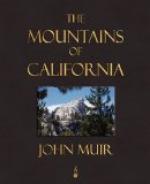Breakfast done, I whistled a tune for him before he went to work, curious to see how he would be affected by it. He had not seen me all this while; but the instant I began to whistle he darted up the tree nearest to him, and came out on a small dead limb opposite me, and composed himself to listen. I sang and whistled more than a dozen airs, and as the music changed his eyes sparkled, and he turned his head quickly from side to side, but made no other response. Other squirrels, hearing the strange sounds, came around on all sides, also chipmunks and birds. One of the birds, a handsome, speckle-breasted thrush, seemed even more interested than the squirrels. After listening for awhile on one of the lower dead sprays of a pine, he came swooping forward within a few feet of my face, and remained fluttering in the air for half a minute or so, sustaining himself with whirring wing-beats, like a humming-bird in front of a flower, while I could look into his eyes and see his innocent wonder.
By this time my performance must have lasted nearly half an hour. I sang or whistled “Bonnie Boon,” “Lass o’ Gowrie,” “O’er the Water to Charlie,” “Bonnie Woods o’ Cragie Lee,” etc., all of which seemed to be listened to with bright interest, my first Douglas sitting patiently through it all, with his telling eyes fixed upon me until I ventured to give the “Old Hundredth,” when he screamed his Indian name, Pillillooeet, turned tail, and darted with ludicrous haste up the tree out of sight, his voice and actions in the case leaving a somewhat profane impression, as if he had said, “I’ll be hanged if you get me to hear anything so solemn and unpiny.” This acted as a signal for the general dispersal of the whole hairy tribe, though the birds seemed willing to wait further developments, music being naturally more in their line.




